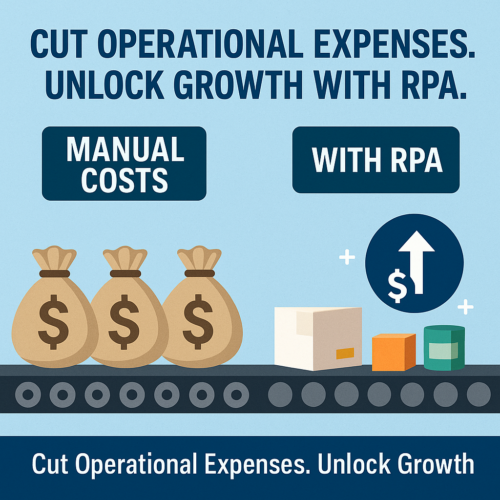RPA in Manufacturing: Boost Productivity and Cut Operational Expenses
Introduction: Automation as a Competitive Advantage
In today’s fast-paced, cost-sensitive manufacturing environment, efficiency is the key to profitability. Modern manufacturing companies are turning to Robotic Process Automation (RPA) to simplify repetitive operations, reduce human error, and achieve consistent cost and time savings across departments.
From inventory control to invoice processing and supply chain operations, RPA is redefining how manufacturing firms operate. In this blog, we’ll explore how RPA helps manufacturing companies save both time and money, while enhancing scalability and productivity.
What is Robotic Process Automation (RPA) in Manufacturing?
RPA is a software-based automation technology that uses bots to perform repetitive, rules-based tasks traditionally handled by humans. Unlike physical robots on a factory floor, RPA works behind the scenes—handling administrative tasks, managing data, and integrating workflows across enterprise systems like ERP, CRM, spreadsheets, and legacy software.
Key Characteristics of RPA:
Operates 24/7 without human supervision.
Interacts with multiple systems simultaneously.
Eliminates data entry errors.
Follows pre-set business rules and logic.
Time-Saving.
Use Cases of RPA in Manufacturing.
1. Automated Inventory Management
RPA bots monitor stock levels in real-time, trigger reorders, update ERP systems, and reconcile data across departments. This reduces manual stock audits and accelerates inventory turnover.
2. Streamlined Procurement Processes
RPA automates vendor onboarding, purchase order creation, approval workflows, and invoice reconciliation. This minimizes procurement cycle time and avoids bottlenecks.
3. Accelerated Invoice Processing
Manual invoice handling is time-consuming and error-prone. With RPA, bots extract data using Optical Character Recognition (OCR), validate it against purchase orders, and automate approvals—cutting processing time by over 70%.
4. Automated Production Scheduling
Manufacturers can use RPA to collect data from sales, inventory, and operations to generate optimized production schedules, enabling better resource planning and reduced idle time.
5. Regulatory Compliance and Reporting
RPA ensures timely, consistent reporting for regulatory compliance by automatically compiling data, generating reports, and maintaining a digital audit trail.
Cost-Saving Benefits of RPA for Manufacturing Companies:
Reduced Operational Costs
RPA bots replace manual labor for high-volume, repetitive tasks—leading to significant cost savings in data entry, document handling, and administrative workflows.
Minimized Human Errors
RPA eliminates costly mistakes that occur due to manual entry or oversight. This reduces the financial impact of rework, penalties, and poor data quality.
Improved Process Efficiency
By streamlining core business operations such as order processing, supplier communication, and reporting, RPA shortens turnaround times and accelerates decision-making.
Lower Training and Staffing Expenses
Since RPA bots are pre-programmed and need no retraining, companies can reduce the time and cost of onboarding and training new staff for repetitive administrative tasks.
Fast Return on Investment (ROI)
Most manufacturers experience a measurable ROI within 6 to 12 months of RPA deployment, thanks to immediate labor savings and improved operational agility.
RPA in Action: Real-World Manufacturing Use Case
A mid-size electronics manufacturing firm integrated RPA with its ERP and accounting systems to automate its invoice and procurement processes. As a result:
Invoice processing time was reduced by 85%
Errors in supplier payments dropped by 92%
Procurement cycle time improved by 40%
The company saved approximately $180,000 annually in operational costs
RPA vs Traditional Automation: A Quick Comparison
Feature RPA Traditional Automation
Implementation Speed Fast (Weeks) Slow (Months)
Integration Works across all existing systems Requires custom APIs or middleware
Flexibility High (easy to scale/modify) Low (rigid processes)
Cost Low to moderate High initial investment
Maintenance Simple updates Complex and resource-intensive
The Future: Intelligent Automation for Smarter Manufacturing
As RPA merges with Artificial Intelligence (AI) and Machine Learning (ML), manufacturing companies can unlock Intelligent Automation. This enables not just task automation but also predictive insights, self-learning workflows, and cognitive decision-making.
Examples include:
Predictive maintenance powered by AI + RPA
Smart supply chain forecasting
Automated exception handling in production
Getting Started with RPA: Best Practices
Identify high-volume, rule-based tasks for initial RPA implementation (e.g., order entry, invoice matching).
Select scalable RPA tools that can integrate with your existing ERP or MES platforms.
Start small and scale gradually across departments.
Choose an experienced RPA implementation partner to ensure long-term success.
Why Choose Us for RPA Services?
At 4devnet, we specialize in delivering custom RPA solutions for the manufacturing sector, tailored to your business needs and technical environment. Our expertise covers:
Automated ERP workflows
Invoice and procurement automation
Integration with SAP, Odoo, and Microsoft Dynamics
Smart reporting and compliance automation
Support for industries including FMCG, automotive, food processing, cosmetics, and logistics
Serving Clients Globally:
We help businesses across India, the Middle East, Europe, and Southeast Asia streamline operations through intelligent automation.
Final Thoughts: Build a Smarter, Faster Manufacturing Operation
Incorporating RPA into your manufacturing business isn’t just about saving time or money—it’s about building a future-ready, agile, and efficient operation. Whether you’re a small manufacturer or a global enterprise, Robotic Process Automation offers scalable benefits that directly impact your bottom line.


